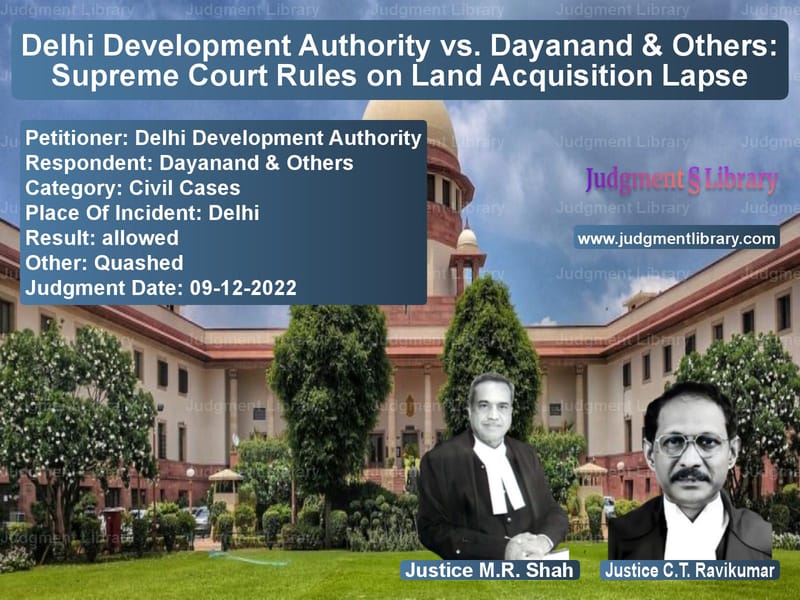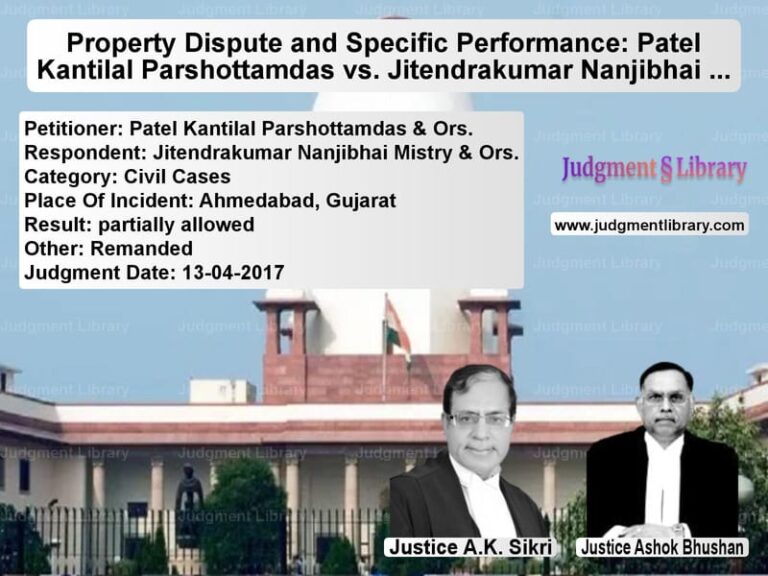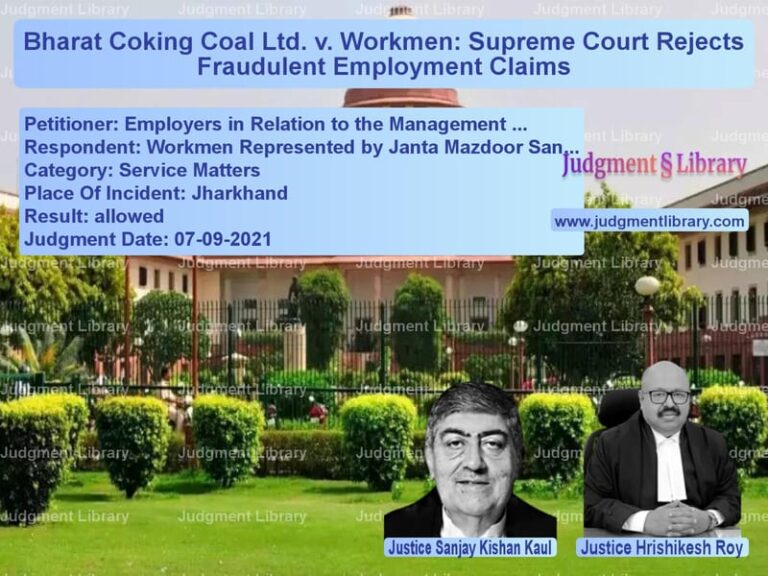Delhi Development Authority vs. Dayanand & Others: Supreme Court Rules on Land Acquisition Lapse
The Supreme Court of India, in its judgment dated December 9, 2022, addressed the issue of land acquisition and the rights of subsequent purchasers in the case of Delhi Development Authority vs. Dayanand & Others. The case revolved around whether land acquisition proceedings could be deemed lapsed under Section 24(2) of the Right to Fair Compensation and Transparency in Land Acquisition, Rehabilitation and Resettlement Act, 2013, solely due to non-payment of compensation, despite possession being taken.
The Supreme Court set aside the Delhi High Court’s order, ruling that a subsequent purchaser has no locus to challenge land acquisition proceedings and that non-payment of compensation alone does not lead to the lapsing of such proceedings. The judgment reinforces the principle that both conditions—non-payment of compensation and failure to take possession—must be met for acquisition to lapse.
Background of the Case
The case arose from a land acquisition dispute concerning the Delhi Development Authority (DDA) and the respondents. The land in question had been acquired under the Land Acquisition Act, 1894, and possession had been taken by the authorities on November 26, 2012. However, the High Court of Delhi, in a writ petition filed by the subsequent purchaser of the land, ruled that the acquisition had lapsed under Section 24(2) of the 2013 Act due to non-payment of compensation.
The DDA challenged the High Court’s decision before the Supreme Court, arguing that the judgment was contrary to settled law and overlooked the fact that possession had already been taken. The case brought up critical legal questions regarding the rights of subsequent purchasers and the conditions for acquisition lapsing.
Arguments Presented
Appellant’s (DDA) Arguments
The Delhi Development Authority, represented by counsel, argued that:
- The High Court erred in ruling that acquisition had lapsed solely due to non-payment of compensation, despite possession being taken.
- The subsequent purchaser had no legal standing to challenge the acquisition under Section 24(2) of the 2013 Act.
- The Supreme Court, in its earlier decisions, had established that both conditions—failure to take possession and non-payment of compensation—must be met for acquisition to lapse.
- The High Court relied on an outdated precedent, whereas more recent Supreme Court rulings had clarified the legal position.
Respondents’ Arguments
The respondents, represented by their counsel, contended that:
- The non-payment of compensation was a sufficient ground to declare the acquisition lapsed.
- The subsequent purchaser, as the current owner of the land, had the right to challenge the acquisition proceedings.
- The decision of the High Court was consistent with prior judgments favoring landowners.
- The delay in paying compensation demonstrated the authorities’ lack of intent to complete the acquisition process.
Supreme Court’s Observations
The Supreme Court examined the case in light of its earlier rulings, particularly the Constitution Bench decision in Indore Development Authority vs. Manoharlal and Others, (2020) 8 SCC 129. The Court reiterated that:
- Both conditions—failure to take possession and non-payment of compensation—must be met for an acquisition to lapse under Section 24(2) of the 2013 Act.
- A subsequent purchaser has no legal standing to challenge land acquisition proceedings.
- The term “paid” in Section 24(2) does not mean “deposited in court,” and compensation refusal by landowners does not result in a lapse of acquisition.
The Court quoted from the Indore Development Authority judgment:
“In case possession has been taken, compensation has not been paid then there is no lapse. Similarly, if compensation has been paid, possession has not been taken then there is no lapse.”
The Supreme Court noted that the High Court had ignored this principle and had wrongly declared the acquisition lapsed based solely on non-payment of compensation.
Judgment and Ruling
Based on these observations, the Supreme Court ruled in favor of the Delhi Development Authority and held that the High Court’s judgment was legally unsustainable. The key rulings were:
- The subsequent purchaser had no right to challenge the acquisition proceedings.
- As possession had already been taken, the acquisition could not be deemed lapsed under Section 24(2) of the 2013 Act.
- The High Court’s decision was overturned, and the writ petition filed by the subsequent purchaser was dismissed.
- The authorities were directed to pay compensation to the recorded owner if it had not yet been disbursed.
Implications of the Judgment
This judgment has significant implications for land acquisition cases across India. It establishes clear legal principles regarding:
- The limited rights of subsequent purchasers in land acquisition disputes.
- The necessity of both possession and non-payment of compensation for acquisition to lapse.
- The importance of adhering to the Constitution Bench ruling in Indore Development Authority.
The ruling safeguards public authorities from unnecessary litigation initiated by subsequent purchasers who were not part of the original acquisition process.
Conclusion
The Supreme Court’s decision in Delhi Development Authority vs. Dayanand & Others reaffirms the legal position that land acquisition does not automatically lapse due to non-payment of compensation. The Court’s emphasis on settled legal principles ensures consistency in land acquisition jurisprudence and protects public development projects from unwarranted legal challenges.
This judgment serves as an essential reference for future land acquisition cases, clarifying the rights of landowners and government agencies in ongoing and future disputes.
Petitioner Name: Delhi Development Authority.Respondent Name: Dayanand & Others.Judgment By: Justice M.R. Shah, Justice C.T. Ravikumar.Place Of Incident: Delhi.Judgment Date: 09-12-2022.
Don’t miss out on the full details! Download the complete judgment in PDF format below and gain valuable insights instantly!
Download Judgment: delhi-development-au-vs-dayanand-&-others-supreme-court-of-india-judgment-dated-09-12-2022.pdf
Directly Download Judgment: Directly download this Judgment
See all petitions in Property Disputes
See all petitions in Landlord-Tenant Disputes
See all petitions in Specific Performance
See all petitions in Judgment by Mukeshkumar Rasikbhai Shah
See all petitions in Judgment by C.T. Ravikumar
See all petitions in allowed
See all petitions in Quashed
See all petitions in supreme court of India judgments December 2022
See all petitions in 2022 judgments
See all posts in Civil Cases Category
See all allowed petitions in Civil Cases Category
See all Dismissed petitions in Civil Cases Category
See all partially allowed petitions in Civil Cases Category







